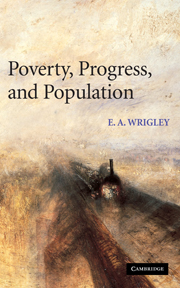Book contents
- Frontmatter
- Contents
- List of figures
- List of tables
- Acknowledgements
- Introduction
- PART I The wellsprings of growth
- 1 The quest for the industrial revolution
- 2 The divergence of England: the growth of the English economy in the seventeenth and eighteenth centuries
- 3 Two kinds of capitalism, two kinds of growth
- 4 Men on the land and men in the countryside: employment in agriculture in early nineteenth-century England
- 5 The occupational structure of England in the mid-nineteenth century
- 6 Corn and crisis: Malthus on the high price of provisions
- 7 Why poverty was inevitable in traditional societies
- 8 Malthus on the prospects for the labouring poor
- PART II Town and country
- PART III The numbers game
- Bibliography
- Index
1 - The quest for the industrial revolution
Published online by Cambridge University Press: 23 December 2009
- Frontmatter
- Contents
- List of figures
- List of tables
- Acknowledgements
- Introduction
- PART I The wellsprings of growth
- 1 The quest for the industrial revolution
- 2 The divergence of England: the growth of the English economy in the seventeenth and eighteenth centuries
- 3 Two kinds of capitalism, two kinds of growth
- 4 Men on the land and men in the countryside: employment in agriculture in early nineteenth-century England
- 5 The occupational structure of England in the mid-nineteenth century
- 6 Corn and crisis: Malthus on the high price of provisions
- 7 Why poverty was inevitable in traditional societies
- 8 Malthus on the prospects for the labouring poor
- PART II Town and country
- PART III The numbers game
- Bibliography
- Index
Summary
The paradox
When Deane and Cole published their pathbreaking study of the growth of the British economy between the late seventeenth and mid-twentieth centuries, they concluded, in effect, that the term ‘industrial revolution’ was meaningful and that the conventional chronology was broadly correct – that over a period of half a century or so beginning in the last decades of the eighteenth century there was a marked acceleration in the rate of growth of the national product, an acceleration so marked that, in spite of the fact that population grew faster in this period than at any earlier or subsequent time, output per head also rose more quickly than previously. ‘At the end of the century, however, there was a crucial change. After 1785, both total output and population were growing much faster than before, but the former now began to draw decisively ahead of the latter. For the first time, per capita output started to increase – at more than three times the average rate for the rest of the period under review [the eighteenth century].’
In one sense it is almost impossible to quarrel with the use of the term ‘industrial revolution’. We live in a world in which it is difficult for people in wealthy countries to see the point of the plea in the Lord's Prayer that we should each day be given our daily bread. Relative deprivation may be severe even in the wealthiest of countries, but few lack the ability to buy as much bread as they can eat.
- Type
- Chapter
- Information
- Poverty, Progress, and Population , pp. 17 - 43Publisher: Cambridge University PressPrint publication year: 2004
- 2
- Cited by



